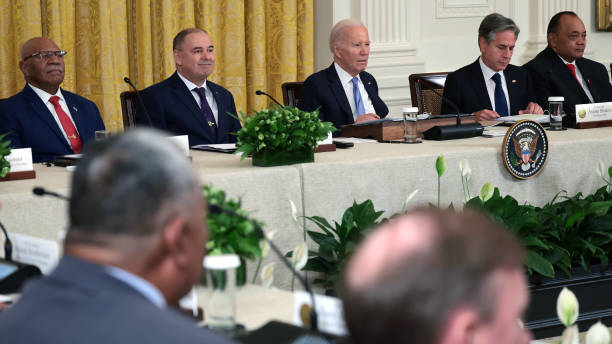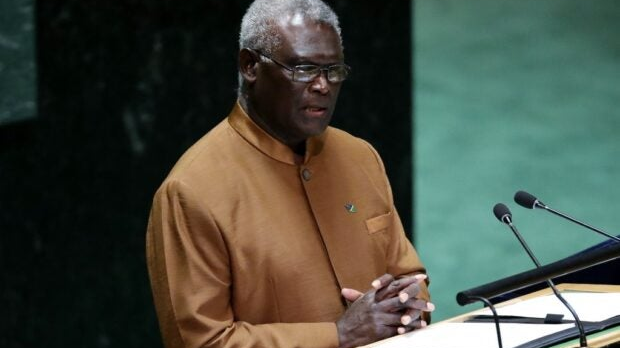
U.S. President Joe Biden and Secretary of State Antony Blinken participate in the Pacific Islands Forum (PIF) as part of the U.S.-Pacific Islands Forum Summit at the White House, Washington D.C., U.S., September 25, 2023. /Getty
U.S. President Joe Biden and Secretary of State Antony Blinken participate in the Pacific Islands Forum (PIF) as part of the U.S.-Pacific Islands Forum Summit at the White House, Washington D.C., U.S., September 25, 2023. /Getty
Editor's note: Imran Khalid, a special commentator on current affairs for CGTN, is a freelance columnist on international affairs. The article reflects the author's opinions and not necessarily the views of CGTN.
In what seems to be an overt signal of its intent to engage in a power struggle for dominance in the South Pacific, U.S. President Joe Biden's administration arranged a second summit with Pacific island leaders in Washington on September 25. The primary goal of the United States in this summit was to thwart and diminish China's burgeoning partnerships with South Pacific nations. This agenda, driven by a narrow vision, underscores the United States' hegemonic disposition, revealing a disconcerting lack of regard for the sovereign nations of the South Pacific.
Ironically, this time, Western media has also candidly described the summit as a strategic maneuver in the ongoing U.S. campaign to curtail China's expanding presence in a region historically considered its own backyard.
In a brazen display of aggressive diplomacy last September, Biden summoned Pacific leaders to the White House for the first-ever regional summit. The U.S. signed the Declaration on U.S.-Pacific Partnership with the Pacific islands, a document replete with hollow promises of a peaceful region.
During the inaugural summit, we witnessed a slew of "grandiose" declarations, from supposedly increased efforts to combat climate change to the dubious promise of bolstered maritime security. The United States, in an ostentatious display of largesse, pledged an additional $810 million into the region, a move dripping with ulterior motives. This "pledged" financial assistance included a dedicated allocation of $130 million to combat and mitigate the consequences of climate change in the region.
Washington also pushed the Partners in the Blue Pacific initiative, an alliance of so-called "like-minded" development partners, seemingly dedicated to advancing their own interests under the guise of Pacific development while conveniently ignoring any genuine concerns about development partner coordination. Ironically, the U.S. preoccupation with Pacific island nations appears more driven by a desire to thwart China than a sincere commitment to fostering regional development – a mentality steeped in hubris.
However, in the last year, very little progress has been witnessed on all this bragging by the Biden administration. President Biden's touted commitment of an extra $810 million may sound impressive, but the devil is in the details. These funds are still awaiting Congress's approval even after the passage of one year.
Furthermore, the newly reopened American embassies in the Solomon Islands and Tonga maintain skeletal staff, while the Congress's nod for the re-negotiated Compacts of Free Association, entailing a substantial US$7.1 billion in funding, hangs in limbo.
Similarly, the Partners in the Blue Pacific initiative is still ambiguous, offering little clarity on the infusion of fresh funds or innovative approaches it brings to the region. Its coordination with Pacific policies and agencies remains an uncertain puzzle, leaving much room for skepticism about its actual impact on the ground.

Solomon Islands Prime Minister Manasseh Sogavare addresses the 78th United Nations General Assembly at UN headquarters in New York, U.S., September 22, 2023. /AFP
Solomon Islands Prime Minister Manasseh Sogavare addresses the 78th United Nations General Assembly at UN headquarters in New York, U.S., September 22, 2023. /AFP
The last-minute cancellation of President Joe Biden's scheduled trip to Papua New Guinea in May was a significant setback for U.S. initiatives in the South Pacific. While the precise diplomatic cost is hard to quantify, it is not without its consequences. This visit would have marked an historic milestone as the first ever by a sitting U.S. president to a Pacific island nation. Not surprisingly, this cancellation only further highlights the myriad reasons why the Pacific Islands perceive a sense of abandonment by the U.S. on the global stage.
The absence of the leaders of the Solomon Islands and Vanuatu from this year's gathering is a reflection of the fact that regional countries are still quite wary of the sincerity of Washington towards the region. In the last one year, other than opening two embassies and signing a Defence Cooperation Agreement with Papua New Guinea , despite high-level diplomatic engagements with the regional leadership, there is nothing that can be termed as "substantial" support by the U.S. for the regional development.
On the contrary, for the last several decades, China has been enthusiastically and generously working for the infrastructure and economic development of the Pacific island nations. That is why, Solomon Islands Prime Minister Manasseh Sogavare recently lauded a series of China-backed programs, including the Belt and Road Initiative, Global Development Initiative, Global Security Initiative, and Global Civilization Initiative during his address at the UN General Assembly's general debate.
This serves as a stark illustration of China's collaborative approach with island nations, founded on mutual respect and devoid of any political impositions. Amidst China's successful foray into the South Pacific, the United States is gripped by a noticeable undercurrent of strategic apprehension.
For nearly three decades, the South Pacific remained on the periphery of U.S. geopolitical calculus. However, this landscape shifted dramatically as China assumed the mantle of the region's primary trading partner and a pivotal investment player. But, according to some media reports, in addition to the fresh commitments in infrastructure and submarine cables, the Biden administration is pushing the idea that Pacific island states should become part of the Quadrilateral Security Dialogue (Quad), a defense cooperation forum that unites the U.S., Australia, India, and Japan for collaborative maritime surveillance. The Quad, seen as a linchpin of Washington's "Indo-Pacific containment strategy" targeting China, is now being extended to the Pacific islands, with an ambitious aim to draw in Vietnam, South Korea, and New Zealand.
Yet, such a proposal threatens to wreak havoc on the peace and security of the region. It's a move that seems more geared towards fanning the flames of tension and escalating geopolitical rivalries rather than fostering stability and cooperation.
(If you want to contribute and have specific expertise, please contact us at opinions@cgtn.com. Follow @thouse_opinions on Twitter to discover the latest commentaries in the CGTN Opinion Section.)